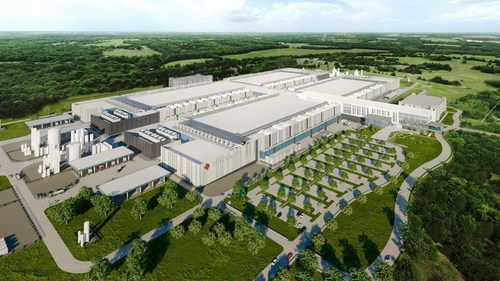DALLAS, Nov. 17, 2021 /PRNewswire/ — Texas Instruments Incorporated (TI) (Nasdaq: TXN) today announced plans to begin construction next year on its new 300-millimeter semiconductor wafer fabrication plants (or “fabs”) in Sherman, Texas. The North Texas site has the potential for up to four fabs to meet demand over time, as semiconductor growth in electronics, particularly in industrial and automotive markets, is expected to continue well into the future. Construction of the first and second fabs is set to begin in 2022.

“TI’s future analog and embedded processing 300-mm fabs at the Sherman site are part of our long-term capacity planning to continue to strengthen our manufacturing and technology competitive advantage and support our customers’ demand in the coming decades,” said Rich Templeton, TI’s chairman, president and CEO. “Our commitment to North Texas spans more than 90 years, and this decision is a testament to our strong partnership and investment in the Sherman community.”
Production from the first new fab is expected as early as 2025. With the option to include up to four fabs, total investment potential at the site could reach approximately $30 billion and support 3,000 direct jobs over time.
The new fabs will complement TI’s existing 300-mm fabs which include DMOS6 (Dallas, Texas), RFAB1 and the soon-to-be-completed RFAB2 (both in Richardson, Texas), which is expected to start production in the second half of 2022. Additionally, LFAB (Lehi, Utah), which TI recently acquired, is expected to begin production in early 2023.
About Texas Instruments
Texas Instruments Incorporated (Nasdaq: TXN) is a global semiconductor company that designs, manufactures, tests and sells analog and embedded processing chips for markets such as industrial, automotive, personal electronics, communications equipment and enterprise systems. Our passion to create a better world by making electronics more affordable through semiconductors is alive today, as each generation of innovation builds upon the last to make our technology smaller, more efficient, more reliable and more affordable – making it possible for semiconductors to go into electronics everywhere. We think of this as Engineering Progress. It’s what we do and have been doing for decades. Learn more at TI.com.

